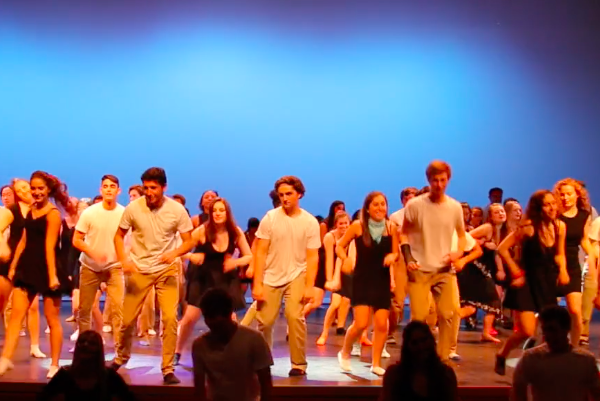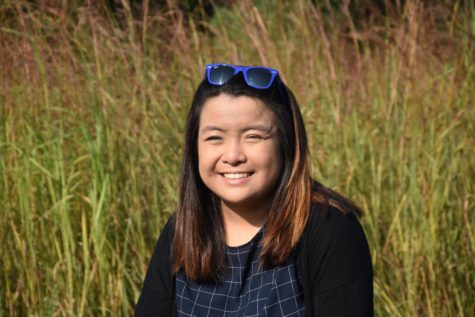A look at the making of Senior Show

The coed dance is typically the largest part of the show. This year, coed is set to have at least 40 dancers. “My favorite part of working on the senior show is watching it all come together and seeing people getting excited about it,” 2017 graduate and show director Tommy Geiger said.
March 28, 2017
Every March, WHS seniors put on a variety show made up of skits and dances mainly organized by students, with little help from class advisors. The Class of 2017 held their senior show on March 17 and 18 after two months of preparation.
That preparation began in mid-January, when EBoard members chose seniors Jenia Brewington, Tommy Geiger, and Clare Lippincott to direct.
“The director’s primary job is to organize the senior class. Once scripts are submitted, directors choose which to include and in what order. After everything is passed by the administration, they cast everyone and proceed with rehearsals and organizing the filming and editing of videos,” director Tommy Geiger said.
All seniors were able to write skits and videos for the show.
“We opened it up to the entire grade. We gave everyone a deadline to write any skits they wanted, and we reviewed all of them and chose which would best fit our show this year,” senior class president Tony Park said.
All scripts in the show had to follow a policy set by administrators for appropriateness.
“We had a system where every script and line had to go through directors, then our class advisors, and finally to the administration. The level [to which] it was censored is edgy to a point where it [is] funny to students, teachers and parents,” Park said.
“Most of the humor is targeted at the student body, so the humor is sometimes reflecting administration decisions. I think the administration is very reasonable about what can can cannot be included,” Geiger said.
“All scripts are written by students. The directors choose which skits will be in the show. We, as advisors, work with administration to proofread and recommend changes as needed to meet with school policy,” senior class advisors Corey Lowen and Jessica Imbornone said.
Once skits were finalized and scripts were chosen, casting began. Seniors received a Google Doc with a list of roles, and they were encouraged to write their names in spaces next to the parts they wanted to play.
“We did our best to get everyone involved and chose the best seniors for each role. Parts were given out in an effort to ensure that everyone who wanted to be involved got involved, while prioritizing those who wrote the scripts,” Geiger said.
“I believe that people who took initiative and showed a lot of interest got the parts that they wanted. I think it was a very open and equal process,” Park said.
The show is intended to get as many students to participate as possible, but at times it was difficult for the directors to get the whole class involved and keep everyone organized.
“Getting people to write scripts was difficult. People were unenthusiastic about coming long days to film and rehearse, until they got on stage or in front of the camera,” Geiger said. “Once involved, whether in a video or a dance or a skit, people started to get very excited and put more effort into their skit.”
This year’s seniors participated in the production in high numbers.
“We are a particularly small class, and we have over 75 percent of our grade participating, whether it be in videos, on stage, helping backstage, or with tech,” Park said.





![Last Wednesday, the Wayland School Committee gathered to discuss a number of topics regarding the health curriculum and Innovation Career Pathway course. Another large topic of conversation was the ways to potentially mitigate distracting cell phone usage. "These [phones] are going to distract your learning and social relationships," Superintendent David Fleishman said. "That's concrete right there."](https://waylandstudentpress.com/wp-content/uploads/2025/06/Screenshot-2025-06-04-at-9.49.31 PM-1200x886.png)



























![Troy Hoyt finishes the Boston Marathon, running for the Hoyt Foundation. T. Hoyt is the son of Hoyt Foundation CEO Russ Hoyt.
“[Running a marathon] might seem like a big thing, when it’s presented to you at first, but if you break it up and just keep telling yourself, “Yes, you can,” you can start chipping away at it. And before you know it, you’ll be running the whole 26 miles, and you won’t even think twice about it.” T. Hoyt said.](https://waylandstudentpress.com/wp-content/uploads/2025/04/C36E8761-1CBB-452E-9DF2-543EF7B1095E_1_105_c.jpeg)












































